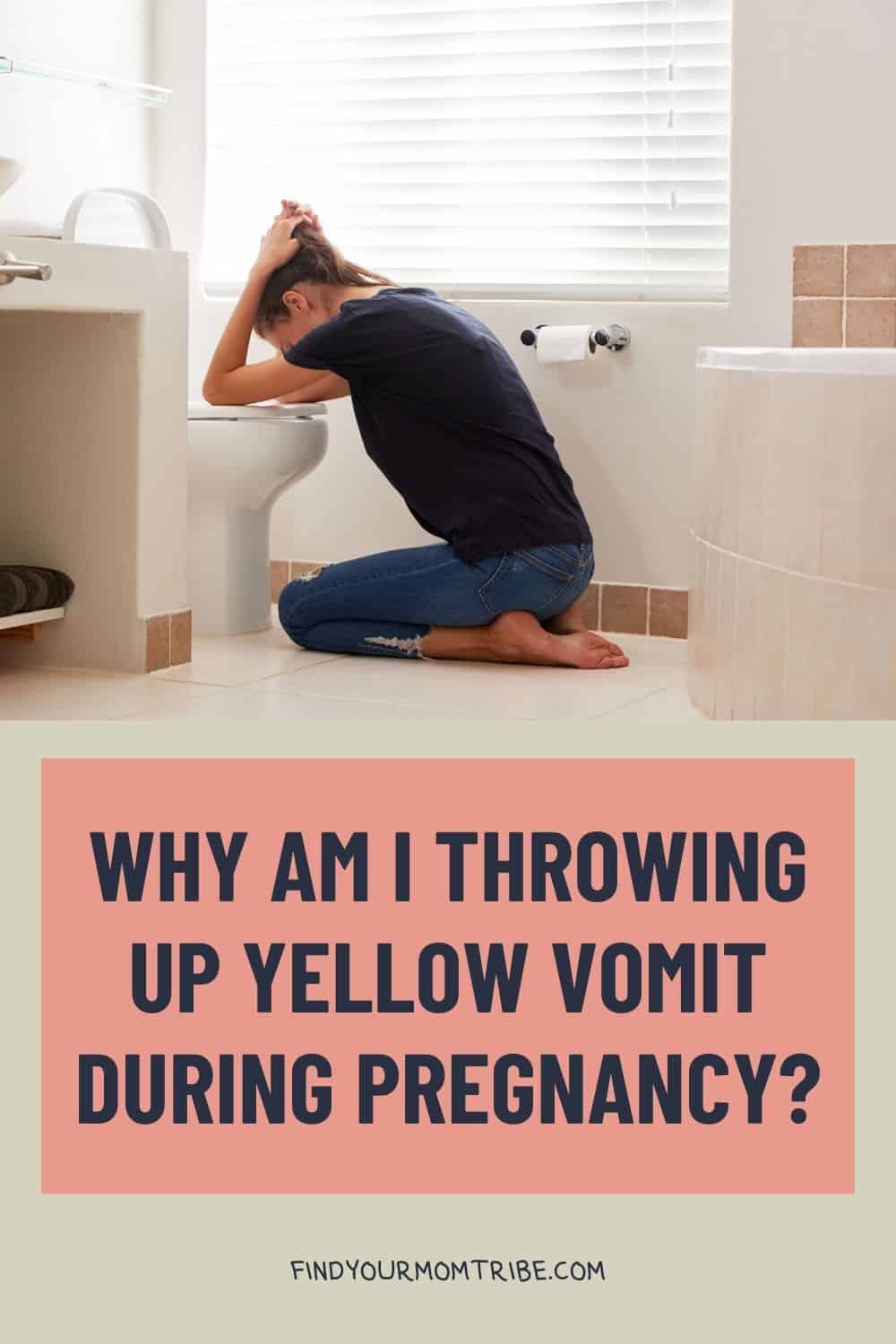Pregnancy can be a complicated time for any mother and it frequently comes with a wide variety of symptoms that could cause concern. One such symptom is seeing yellow vomit during pregnancy, but is it really something to be scared of?
The truth of the matter is that yellow vomit during pregnancy is quite common, especially if you get frequent bouts of morning sickness. Chances are the yellow liquid is the stomach acid from an empty gut.
Other than causing a slight, but nasty, burn to your esophagus, there’s nothing really to worry about. However, if it does keep happening, you may want to take some precautions to try prevent it as it can be super uncomfortable and moms-to-be have enough on their plate as it is.
Aside from that, it could develop into a chronic thing if not stopped. I’m pretty sure that this is something every pregnant woman would rather avoid.
So, how can you deal with this common pregnancy symptom of throwing up yellow bile and what does it mean to throw up yellow liquid while pregnant? Read on to find out.
What Causes Yellow Vomit During Pregnancy?

Usually, when we vomit, we throw up our most recent meal.
However, with an empty stomach, the only thing left to throw up is stomach acid or yellow bile which results in yellow vomit.
You might be wondering why this happens during pregnancy. The answer is pretty simple: pregnancy hormones.
Hormones are the most notorious troublemakers for a pregnant woman, especially during the first trimester where their levels are all over the place with progesterone and estrogen being the main culprits.
There’s also the matter of rising hCG (human chorionic gonadotropin) levels. This hormone is produced by the placenta when it recognizes a pregnancy, helping it prepare to grow a new human life.
This hormonal cocktail can wreak havoc on your entire system, not just your gut. But for most women, it’s exactly the gut that’s most affected and I don’t just mean the weird food cravings, but all sorts of other uncomfortable things as well.
All these rapid hormonal changes are what make early pregnancy such a tumultuous experience, but don’t worry yourself too much, it’s all part of the process of becoming a mother.
What Are The Symptoms Of This Type Of Vomiting?

Dealing with yellow vomit or morning sickness can be a nuisance in general, especially if you’re out and about.
Here are some of the most common symptoms that might accompany vomiting so you can know what to expect:
• abdominal pain and cramping
• heartburn
• a metallic or bitter taste in your mouth from the acid
• the feeling of motion sickness
• severe nausea
• lack of appetite
• dehydration
Depending on your stomach contents and the severity of your condition, the stomach contents can change consistency to be either mucusy or even foamy. Note that if the vomit has a mucus-like consistency, this might be a sign of a more severe case.
Signs Of Severe Morning Sickness

While vomiting is one of the classic early signs of pregnancy, do be aware that it’s also not healthy for it to occur often during the day because that can be an early sign of a more serious condition.
There’s a fine line between one or two occurrences a day and throwing up frequently which puts you at higher risk of more severe symptoms such as:
• severe dehydration
• weight loss
• loss of electrolytes
• severe malnutrition
• constipation
• frequent bouts of confusion and fainting
The medical term for this more serious condition is hyperemesis gravidarum (HG) and it can lead to even worse complications if left unchecked.
If you spot any of these symptoms, please make sure to get medical advice from your doctor or any other qualified and trained healthcare professional.
They’ll be able to provide you with the most accurate health information and proper medical procedures and treatment options to get everything under control so you can continue with your pregnancy normally.
The easiest way to know if you need to go to a doctor is if you notice some of the more serious side effects of throwing up such as severe weight loss, the inability to hold any food or liquid down for extended periods, throwing up almost immediately after eating, or frequent fainting.
What Other Symptoms Should You Be On The Lookout For?

Aside from yellow vomit during pregnancy and the other symptoms listed above, there are a few additional ones you should also be on the lookout for.
They could indicate a more serious condition that requires immediate medical attention.
Some of the most common ones are:
• extremely dark urine (dehydration)
• peeing less or not peeing at all
• traces of blood in your vomit
• strong and frequent headaches
• general weakness
• feeling short of breath or having a hard time breathing in general
• extreme pain in your gallbladder
• heavy abdominal cramps and pain
• blurry vision
• swelling and/or bloating of your extremities
All of these could be potential signs that something is wrong and that you need medical attention.
Although these may just be signs of an infection, things such as gallbladder pain or pain in your appendix may require surgery before you give birth otherwise they could cause serious complications that’ll put both you and your baby in distress.
When Does Vomiting Yellow During Pregnancy Begin?

According to most cases, yellow vomit typically occurs in the earlier weeks of pregnancy (6th or 7th).
The duration tends to vary greatly but it usually lasts up to three months.
This might sound grueling, however, it reaches its peak at the end of the first month after which it becomes a rarer and rarer occurrence until it completely fades away.
That said, for some women, this condition can last for the full 9 months of pregnancy simply because of hormonal imbalances.
Luckily, these cases of severe vomiting are pretty rare and chances are you’re unlikely to have to deal with it for that long.
And, if you do end up dealing with this long-term, you can still rest assured that you’ll have a healthy pregnancy.
Easing The Symptoms Of Yellow Vomit During Pregnancy

As mentioned earlier, most cases of this are relatively mild and, aside from the discomfort and bouts of nausea, they won’t cause you much issue.
While full prevention is impossible, there are a few things that may help you deal with the vomiting or reflux and help ease the symptoms:
• Make sure to always get plenty of rest. Pregnancy can be exhausting and the exertion may be the cause of your frequent throw-ups.
You have to realize that you’re in a more delicate state now and you may not be able to follow your pre-pregnancy lifestyle.
Make more time in your schedule to rest up and let your body’s batteries recharge. You may see an improvement in your condition.
• Even when faced with a loss of appetite as one of the symptoms, make sure to eat. Your body needs nutrition and if it’s always expelling food, chances are you’re likely not getting any.
Do note that you can’t just eat anything, even if your food cravings suggest otherwise.
One particular food type that you should avoid if you’re struggling with nausea is spicy foods. Try sticking to more dry foods that can help soak up liquid or slow down the digestion process so you can keep things down.
Some of the best foods for this are carb-heavy things such as saltine crackers, pretzels, and toast. You can also grab foods that fit into the B.R.A.T. (Bananas, Rice, Applesauce, and Toast) diet as they’re proven to be helpful when dealing with vomiting and diarrhea.
• If you want to reduce the intensity of the post-vomit acid reflux, try grabbing a late-night snack to have something digesting in your stomach overnight. This’ll help simmer down the symptoms of yellow vomit during pregnancy.
It may lessen the amount thrown up or even prevent it altogether on some days, though it depends from person to person.
Do stick with something light such as a simple pretzel, a few slices of toast, or some light protein like almonds so that you don’t potentially ruin your sleep quality.
You can also try snacking really early in the morning, but the former method has proven to be a bit more effective.
• Ginger ale or various forms of tea can be lifesavers in these situations. Once again, what works for regular bouts of vomiting or diarrhea works in this case too.
RELATED: Benefits Of Drinking Lemon And Ginger Tea During Pregnancy
Tea is a good alternative to water if regular water seems to agitate your tummy a bit too much. If you have a particularly hard time keeping things down, stick to a sip or two every few minutes or so.
• Add some vitamin B6 to your diet if nausea is your main concern. It’s commonly found in most proteins like peanuts, oats, chicken, and bananas.
• In cases of severe electrolyte loss, you may need to get some intravenous assistance. Contact your doctor, explain your symptoms, and ask if you could be hooked up to an IV to make up all of the lost electrolytes so your body can absorb liquids normally again.
• Talk to your doctor regardless. If you’re having a hard time, ask them if there’s over-the-counter medication that you might be able to take to help lessen the symptoms so you can function properly.
While these are all things that you can do to help, there’s one thing that you should absolutely avoid when you’re dealing with throwing up yellow bile, and that’s brushing your teeth immediately after.
The aftertaste of throwing up may be bad, but the stomach acid attacks the tooth enamel covering your teeth, making it easy to scrape off with a toothbrush.
Instead, use some water to rinse out your mouth and brush your teeth a little later.
In Conclusion
While yellow vomit is nothing more than stomach bile, it can be really uncomfortable as it goes up your esophagus and burns the lining.
The metallic and bitter aftertaste is no picnic either.
But, it’s all just a regular part of pregnancy and therefore nothing to worry about. However, it should be monitored in case it becomes slightly “abnormal”.
If it starts happening frequently enough that you can’t eat or drink properly, and you start losing weight or feeling dehydrated often, it’s time to call in some proper medical help as you may be dealing with hyperemesis gravidarum.
Don’t worry though, most cases are mild and I’m sure yours will be no exception.
The worst should pass in about a month and after that it’ll just become a passing thought. I’m sure you’ll be able to deal with it easily, mamma. Until next time!
Like this post? Please share or pin it for later. You can also stay in the loop and follow us on Facebook, Instagram or Pinterest.

We love honesty! Find Your Mom Tribe is an Amazon Associate and we earn from qualifying purchases through affiliate links at no extra cost to you. Please see our full Amazon Affiliate disclosure for more information.

